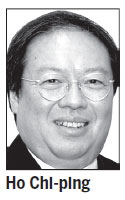HK as an 'education hub'
Updated: 2012-08-08 07:00
By Ho Chi Ping(HK Edition)
|
|||||||

The term "education hub" is often used in Hong Kong, either as a selling-point for its universities, or as a goal for the city. The government has adopted the term in its agenda: former undersecretary for education Kenneth Chen led a delegation to the Going Global Conference in London earlier this year, with the purpose of promoting the city as a regional educational hub.
People usually understand an "education hub" to be a city with internationally-renowned universities, a large international population of students and selective academic programs for all levels of higher-education (undergraduate and post-graduate). London and Boston immediately come to mind as examples.
Higher education boosts a city's economy through economic spillovers. A large population of college students directly increases GDP, and not just from tuition fees. College students support many sectors of the economy, such as the entertainment sector. Some students inevitably choose to stay in the city where they undertake their studies, giving local companies a more varied talent pool from which to recruit. Finally, college students are young, educated and upwardly-mobile, which helps put cities "on the map".
Perhaps the most important aspect of an education hub is that every one, be it London, Boston, Oxford or Berkeley, is a net "exporter" of educational services. Students travel to hubs to consume education services, rather than staying in their own cities or countries. In other words, these cities have an excess of high-quality university places, filled by external or global demand.
No matter what the politicians and marketers may say, Hong Kong is not an exporter of educational services. Instead it "imports" education by sending countless students abroad. This is not to criticize the quality of local universities, which are of an international standard. Nor is this to lament that Hong Kong is suffering from a "brain drain"; after all, most of these students return home after they have finished their higher education. The issue is instead excess demand: more people want high-quality university places than there are actual places to give them here. This problem extends across the entire education system, as the long waiting list for international schools shows.
This means that it is unlikely that Hong Kong's education center will become a "profit center" in the near future. Higher education in Hong Kong is already subsidized heavily by the government. Unless foreign students pay the entire cost of their education, i.e. aren't subsidized at all, and then some, there is no net gain.
In addition, every place given to an international student is in effect one less place available for a local student. The primary purpose of Hong Kong universities, after all, is to educate the local population. I am not suggesting that we close our doors to foreigners; on the contrary, Hong Kong really stands to gain from having a larger body of international students. However, we need to recognize that this comes with trade-offs, at least in the short-term.
Hong Kong probably has the credibility to become an education hub but, as of now, expecting the education sector to provide a new source of service export revenues is unreasonable.
Instead, we need to use international students to improve the quality of Hong Kong education. Universities need diverse student populations to provide diverse opinions, stimuli and perspectives. A more international student body, even if its absolute numbers are small, allows for a greater sharing of ideas and cultures.
Seeking a more diverse student body, and making Hong Kong an "education hub" seems like the same thing. The objective is different, however: for creating diversity in its student body, the goal is to improve the quality of Hong Kong's education, while to create Hong Kong as an education hub, the goal is to provide Hong Kong with a direct contribution to GDP. Striving for greater diversity is an achievable goal, given that Hong Kong will be a net importer of education for some time.
Hong Kong should strive to make its education sector globally competitive, but we should not fool ourselves into appealing for foreign students for the sake of the income that comes with it. Before it can truly become an education hub, and allow its universities to thrive, Hong Kong needs to solve the problem of excess demand. When large numbers of Hong Kong students are no longer required to look outside of Hong Kong to study, then our education sector can truly appeal to global demand.
The author is former secretary for home affairs of the HKSAR government.
(HK Edition 08/08/2012 page3)